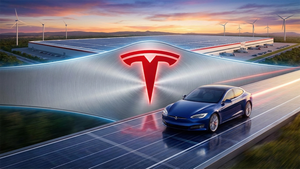
As of November 6, 2025, Tesla (NASDAQ: TSLA) finds itself at a critical juncture, with its stock demonstrating a notable rebound after an initial dip earlier in the week, all eyes are on a highly anticipated shareholder vote scheduled for today. The vote is set to determine the future of CEO Elon Musk's colossal $1 trillion performance-based compensation package, alongside other crucial proposals that could redefine the electric vehicle giant's strategic direction and leadership structure. The recent volatility underscores a divided market sentiment, with investors weighing the perceived indispensability of Musk's vision against concerns over corporate governance and potential shareholder dilution.
The immediate implications of the stock's rollercoaster ride this week are clear: institutional investors are signaling their apprehension regarding the proposed compensation. The initial decline was triggered by announcements from major shareholders, including Norway's sovereign wealth fund and the California Public Employees' Retirement System (CalPERS), both expressing opposition to Musk's pay package. Their concerns highlight a broader focus on executive compensation's fairness and its potential impact on long-term shareholder value. However, the subsequent recovery suggests a complex interplay of factors, including broader market strength and perhaps a renewed optimism among other investors regarding the vote's outcome, pushing Tesla shares upwards as the decisive moment approached.
Shareholder Showdown: Billions at Stake and a Vision for the Future
The shareholder meeting on November 6, 2025, is far more than a routine corporate event; it is a referendum on Tesla's future under Elon Musk's leadership and its ambitious pivot into artificial intelligence and robotics. The most contentious item on the ballot is the proposed $1 trillion performance award for Musk, a staggering 10-year compensation plan tied to Tesla achieving an $8.5 trillion market capitalization by late 2035, alongside aggressive operational milestones such as 20 million vehicle deliveries and the deployment of 1 million robotaxis and Optimus bots. The board of directors has vehemently advocated for its approval, arguing it is essential to retain and incentivize Musk, whom they deem critical for the company's ventures into AI. They have even issued a stark warning that Musk might consider stepping down if the package is rejected, intensifying the stakes for shareholders.
This proposed compensation is not new; it serves as a replacement for a 2018 award, valued at $56 billion, which was voided by a Delaware judge in January 2024 and remains embroiled in litigation. The current proposal aims to ensure Musk receives compensation regardless of the ongoing legal battle. Beyond the compensation, shareholders are also voting on a proposal to allow Tesla to invest in xAI, another artificial intelligence company founded by Musk, further entangling his various ventures. Crucially, Musk has publicly expressed his desire to achieve approximately 25% voting control of Tesla to safeguard his influence over the company's burgeoning AI projects. Currently holding a 13-15% stake, he is permitted to vote his own shares on this matter, adding another layer of complexity to the governance debate.
The timeline leading up to this moment has been fraught with tension. The Delaware court's decision in January 2024 to invalidate the previous compensation package set the stage for this renewed battle. Since then, Tesla's board has worked to craft a new proposal, facing scrutiny from institutional investors and proxy advisory firms. The recent announcements from sovereign wealth funds and large pension systems like CalPERS, declaring their opposition, underscored the significant hurdle the board faced in securing approval. Despite these challenges, Tesla's stock has shown resilience, with year-to-date gains between 10% and 14%, though it has slightly underperformed the S&P 500. The recovery in the days immediately preceding the vote suggests a significant portion of the market remains bullish on Tesla's long-term prospects, contingent on the outcome of today's critical decisions.
Key players in this drama include Elon Musk himself, the Tesla board of directors, and major institutional shareholders like Norway's sovereign wealth fund and CalPERS, whose votes carry significant weight. Proxy advisory firms have also played a crucial role in shaping investor sentiment. Initial market reactions to the opposition were negative, leading to a stock dip. However, the subsequent rebound indicates that while governance concerns are present, a strong segment of the market believes in Musk's leadership and the potential for future growth, especially in the AI and robotics sectors that are central to Tesla's evolving strategy. The outcome of today's vote is poised to be a defining moment for the company, potentially influencing its trajectory for the next decade.
Corporate Crossroads: Winners and Losers in the Wake of the Vote
The outcome of Tesla's (NASDAQ: TSLA) shareholder vote today, November 6, 2025, carries profound implications not only for the electric vehicle pioneer but also for its vast ecosystem of competitors, suppliers, and the broader technology landscape. The key proposals—Elon Musk's massive compensation package, the potential investment in xAI, and changes to voting control—each present distinct financial, operational, and strategic ripple effects depending on their approval or rejection. Prediction markets, notably, lean heavily towards the approval of Musk's compensation, with probabilities ranging from 92% to 96%.
Should the proposals be approved, Tesla itself would likely experience a surge in investor confidence, reinforcing the perception of Musk's long-term commitment and vision. This could provide a short-term boost to the stock, despite the long-term concerns about potential stock dilution from the compensation package. Operationally, Musk's continued, incentivized leadership is expected to accelerate ambitious projects like Optimus robots and Full Self-Driving (FSD) capabilities, further solidifying Tesla's pivot into an "AI and robotics juggernaut." The investment in xAI could lead to deeper integration of advanced AI models into Tesla's products, potentially unlocking new revenue streams from AI software subscriptions and strengthening its position in the integrated automotive AI space. However, this also introduces financial risk, as xAI has high capital requirements and a long path to profitability, potentially diverting capital from core EV manufacturing.
Conversely, a rejection of the proposals, particularly Musk's compensation, could plunge Tesla into a period of significant uncertainty. Musk has openly threatened to reduce his commitment or even leave if his demands for increased control and compensation are not met. Such an outcome could trigger a sharp decline in Tesla's stock as investors react to leadership instability and potential strategic drift. Operationally, progress on key AI and robotics initiatives could slow, and the company might struggle to retain top talent motivated by Musk's vision. Without direct investment in xAI, Tesla's access to cutting-edge AI research might be limited, potentially hindering its ability to compete with other tech giants in the AI race. This scenario would likely be viewed positively by shareholders concerned about corporate governance and the concentration of power, but it risks undermining the very leadership that many believe is essential for Tesla's future.
For competitors in both the EV and AI/robotics sectors, the vote's outcome presents a double-edged sword. If Tesla's proposals are approved, intensified competition from a highly motivated and well-funded Tesla under Musk's reinforced leadership could force rivals like Ford (NYSE: F), General Motors (NYSE: GM), Rivian (NASDAQ: RIVN), Lucid (NASDAQ: LCID), and especially Chinese EV giant BYD (OTC: BYDDY) to significantly increase their R&D spending to keep pace. Tesla's aggressive push into AI and robotics, potentially integrating xAI's capabilities, would redefine the competitive landscape, shifting the battleground from merely vehicle production to comprehensive AI-driven mobility. Conversely, if the vote leads to perceived leadership instability or governance failures at Tesla, it could create opportunities for these competitors, allowing them to attract investor capital and potentially gain market share if Tesla faces leadership instability or a slowdown in innovation. Similarly, AI/robotics companies such as Waymo (NASDAQ: GOOGL), Cruise (NYSE: GM), Boston Dynamics, and Nvidia (NASDAQ: NVDA) could face either heightened competition or a temporary reprieve depending on Tesla's strategic trajectory post-vote. The supply chain would also be impacted; approval could mean surging demand for batteries, chips, and components, requiring suppliers to scale rapidly, while rejection might lead to revised, potentially lower, production forecasts.
Broader Implications: Reshaping Governance, Compensation, and the AI Frontier
Tesla's (NASDAQ: TSLA) shareholder vote on November 6, 2025, transcends the immediate fate of Elon Musk's compensation or the company's strategic direction; it serves as a critical barometer for several overarching trends in the corporate world. This event is a stark illustration of the ongoing tension between ambitious founder-led vision and the increasing demands for robust corporate governance, setting potential precedents for executive compensation, the integration of artificial intelligence, and the balance of power within high-growth tech companies.
The debate over Musk's proposed $1 trillion performance-based compensation package, the largest ever conceived, spotlights a growing trend of shareholder activism and intense scrutiny of executive pay. This is particularly true for "pay-for-performance" models, where the sheer scale of the potential payout challenges traditional notions of fair compensation and raises questions about potential shareholder dilution. The repeated invalidation of Musk's 2018 compensation by the Delaware Court of Chancery, citing concerns over board independence and fiduciary duties, underscores a heightened judicial and regulatory focus on how such packages are structured and approved. Tesla's reincorporation to Texas in June 2024, following these legal challenges, further highlights companies' attempts to navigate legal environments perceived as more favorable to their corporate governance structures and executive incentives.
Furthermore, the proposals regarding an investment in xAI and Musk's desire for increased voting control reflect the accelerating trend of deep AI integration across industries and the inherent governance challenges in founder-led companies. With AI becoming a critical business necessity, Tesla's aggressive push to embed xAI's capabilities into its vehicles, robotaxis, and Optimus robots signals a strategic imperative to lead in integrated AI solutions. However, this also amplifies concerns about conflicts of interest, transparency, and the allocation of resources when a single individual leads multiple intertwined ventures. The potential for Musk to achieve approximately 25% voting control, a figure he deems essential for his commitment to Tesla's AI future, brings to the fore the delicate balance between empowering a visionary leader and ensuring independent oversight for broader shareholder interests.
The ripple effects of this vote are expected to resonate throughout the EV and broader tech industries. A successful vote, reinforcing Musk's control and Tesla's AI strategy, could intensify competition for talent and R&D capital, pushing rivals like Rivian (NASDAQ: RIVN), Lucid (NASDAQ: LCID), General Motors (NYSE: GM), Ford (NYSE: F), and BYD (OTC: BYDDY) to accelerate their own AI integration efforts and potentially form new strategic partnerships. It would further solidify the convergence of AI, robotics, and automotive technology, potentially spurring more cross-industry collaborations and M&As. Conversely, if the vote leads to perceived leadership instability or governance failures at Tesla, it could create opportunities for competitors to attract capital and talent by presenting more stable growth trajectories. Regulatory bodies like the SEC may also face pressure to issue stricter guidelines regarding board composition, disclosure requirements for founder-led companies, and the approval processes for large executive compensation and related-party transactions, drawing parallels to past regulatory interventions concerning Musk's public statements and Tesla's governance.
The Road Ahead: Navigating Tesla's Post-Vote Future
The immediate aftermath of today's shareholder vote on November 6, 2025, will set the tone for Tesla's (NASDAQ: TSLA) short-term market performance and long-term strategic evolution. Should the shareholders approve Elon Musk's ambitious compensation package, the investment in xAI, and the shift to simple majority voting, the company is poised for an aggressive push towards its vision as an AI and robotics leader. The stock could experience a positive bump, reflecting renewed investor confidence in Musk's continued commitment and the validation of his integrated strategy. Musk, now incentivized by a potentially trillion-dollar package and enhanced control, is expected to intensify his focus on achieving monumental targets: an $8.5 trillion market cap, 20 million vehicle deliveries, 1 million robotaxis, and the widespread deployment of Optimus robots. The integration with xAI would likely accelerate, fostering deeper collaboration on AI features for vehicles and potentially expanding Tesla's reach into general AI.
However, the path forward is fraught with challenges, even with approval. The sheer scale of these targets demands unprecedented operational excellence and technological breakthroughs, testing Tesla's execution capabilities to their limits. The potential for significant stock dilution over the next decade, tied to Musk's compensation, will remain a long-term concern for some investors. Conversely, a rejection of the proposals, particularly the pay package, would introduce immediate and profound uncertainty. Tesla's stock would likely face a sharp decline as the market grapples with the possibility of Musk's reduced engagement or even departure, a scenario explicitly warned against by the board. Such an outcome would force the board to devise an alternative retention strategy for its charismatic CEO, potentially diverting his attention to his other ventures and slowing Tesla's aggressive AI and robotics ambitions.
In the long term, strategic pivots would be inevitable regardless of the vote's outcome. With approval, Tesla would double down on its transformation, requiring massive scaling of production, aggressive R&D in AI and robotics, and a relentless pursuit of its FSD and robotaxi goals. This presents significant market opportunities in AI-driven services and new product categories, but also operational hurdles in managing such rapid, multifaceted growth. A rejection, however, would necessitate a more fundamental adaptation. Tesla might need to redefine its leadership structure, potentially becoming less reliant on a single visionary and adopting more conventional corporate governance. This could open opportunities for competitors to capitalize on any perceived leadership vacuum or strategic slowdown at Tesla, while potentially attracting investors who prioritize strong independent oversight. The coming months will reveal the market's initial verdict and how Tesla, under its determined leadership, adapts to the mandate delivered by its shareholders today.
A Defining Moment: Tesla's Path Forward and Investor Watchpoints
The shareholder vote at Tesla (NASDAQ: TSLA) on November 6, 2025, represents far more than a routine corporate decision; it is a defining moment poised to reshape the company's trajectory for the next decade and send ripple effects throughout the global financial markets. The intense scrutiny surrounding Elon Musk's compensation, the potential investment in xAI, and the debate over voting control underscores the unique challenges and opportunities inherent in a founder-led, hyper-growth enterprise at the forefront of technological innovation.
The key takeaways from this pivotal event revolve around the unprecedented scale of Musk's proposed compensation, its ambitious performance targets, and the explicit link between his incentivization and Tesla's aggressive pivot into AI and robotics. The vote also highlighted the ongoing tension between shareholder demands for robust corporate governance—exemplified by the opposition from major institutional investors like Norway's sovereign wealth fund and CalPERS—and the board's conviction that Musk's singular vision is indispensable for achieving Tesla's audacious goals. The potential investment in xAI further blurs the lines between Musk's various ventures, raising questions about conflicts of interest and resource allocation, while the debate over voting control speaks to the fundamental balance of power within the company.
Moving forward, the market's immediate reaction will be crucial. If the proposals are approved, it will likely be interpreted as a powerful endorsement of Musk's leadership and his integrated vision, potentially leading to an initial positive surge in Tesla's stock as uncertainty about his long-term commitment is alleviated. However, the true test will lie in Tesla's ability to demonstrate tangible progress towards the demanding operational and financial milestones tied to the compensation package, as well as the successful integration and monetization of xAI's technologies. Conversely, a rejection, particularly of the compensation, could trigger significant market turbulence, raising concerns about leadership stability and potentially leading to a near-term decline in the stock as investors grapple with the implications for Tesla's strategic direction and Musk's future engagement.
Ultimately, this vote will have a lasting impact on corporate governance standards, particularly for founder-led tech giants, setting precedents for executive compensation and the management of "key person risk." It will also critically influence Tesla's strategic direction, either cementing its aggressive transformation into an AI and robotics powerhouse or forcing a re-evaluation of its leadership structure and ambitious goals. For investors, vigilance is paramount in the coming months. Closely monitor the official vote results and any subsequent statements from Tesla's board or Elon Musk, as these will provide crucial insights into the company's immediate plans. Track Musk's engagement levels and public statements, and critically assess Tesla's operational and financial performance against its ambitious milestones, especially progress on Full Self-Driving, robotaxi deployment, and advancements in humanoid robotics. Furthermore, if the xAI investment is approved, scrutinize the details of the strategic collaboration and clear pathways to monetization. This vote has undoubtedly set the stage for a potentially transformative period, and its ramifications will echo across Tesla's stock performance, strategic initiatives, and corporate governance for years to come.
This content is intended for informational purposes only and is not financial advice





